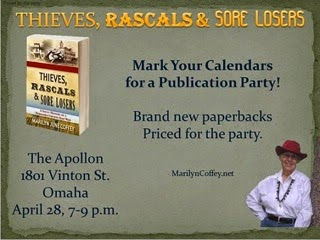Today is publication day for THIEVES, RASCALS & SORE LOSERS, and tonight is my publication party. Join us if you can.
And here is my last tidbit from that book.
The Last Stand
Gen. Thomas Duncan, "a jolly, blustering old fellow," ordered his soldiers to trash the Pawnee Killer's village.
There the men found some curious objects: surveyor tools, measuring chains, compasses, levels, and telescopes. Could the tools belong to that surveyor Buck and his men, missing since August?
After destroying the village, Gen. Duncan and his men searched for Pawnee Killer and his tribe for nearly a month before they gave up and turned back to Fort McPherson.
This may sound as if they accomplished little. However, their destruction of the Sioux village so soon after the Summit Springs battle gave the military an upper hand in the Republican River valley. Indian troubles there stopped almost entirely.
The expedition also served Buffalo Bill well. From it, he created an excellent scene for his Wild West Show. He called it "Last Stand of the Indians."
Coming April 28
THIEVES, RASCALS & SORE LOSERS:
The Unsettling History of the Dirty
Deals that Helped Settle Nebraska
by Marilyn June Coffey
from: a JoLt of CoFFeY
An Intermittent Newsletter
by Marilyn June Coffey
Want me to take you off this mailing list?
Reply and write REMOVE in the subject line.









